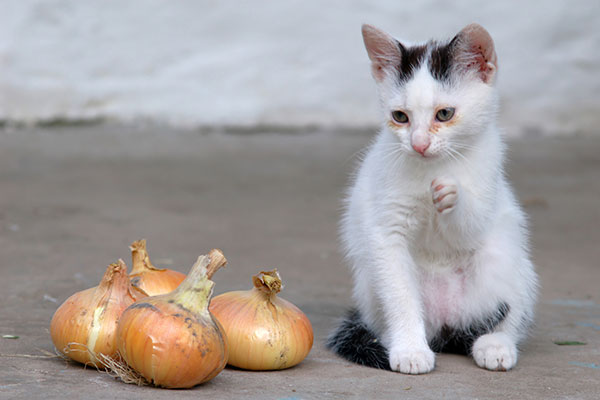Onion is one of the most common vegetable spices out there. Being such a key flavorful ingredient in a variety of dishes, it’s almost impossible to miss onion bulbs in a regular kitchen shelf. Like many spices, onions can be consumed either cooked or raw.
If you’re a proud cat owner, it’s difficult to resist the urge to serve your feline friend onion-containing foods. That’s because humans pretty much view cats as part of the family.
But while many human foods are completely safe for cats, certain foods can trigger a host of deadly side effects. As a responsible cat owner, it’s important to understand the safety of every human food before offering it to your cute, feline companion.
That brings us back to our question, are onions safe for cats? Can cats eat onions?
The answer is a resounding NO. Onion, like most members of the genus Allium, are considered highly toxic to cats. Exposure to even the tiniest bits of onions could result in a medical condition known as onion poisoning. The condition manifests in a variety of gastrointestinal and anemia-like symptoms. Without urgent medical intervention, your adorable kitto could succumb to onion poisoning.
So, are onions bad for cats?
Yes, exposure to onions could prove life-threatening to cats. As you shall find, onions contain a variety of compounds known to cause onion toxicity in cats.
Read on as we delve deeper into what makes onions toxic to cats and what you can do if your cat accidentally got exposed to these spices.
Table of Contents
What Makes Onion Poisoning To Cats?
One of the frequently asked questions by pet parents is, ‘are onions poisonous to cats?’
As we’ve already pointed out, onions are potentially toxic to cats.
Onions contain numerous chemicals that have been shown to be harmful to both cats and dogs. The most poisonous of these compounds are disulfides and thiosulphates.
One specific disulfide – n-propyl disulfide – is the chemical in onion that gives the plant its distinctive aroma. N-propyl disulfide is also the compound that causes eye irritation and induces tearing whenever you’re slicing an onion.
Now, the human body contains powerful enzymes that can handle disulfides and thiosulphates effectively. However, the same cannot be said about our feline friends. Ingesting these compounds could cause onion poisoning.
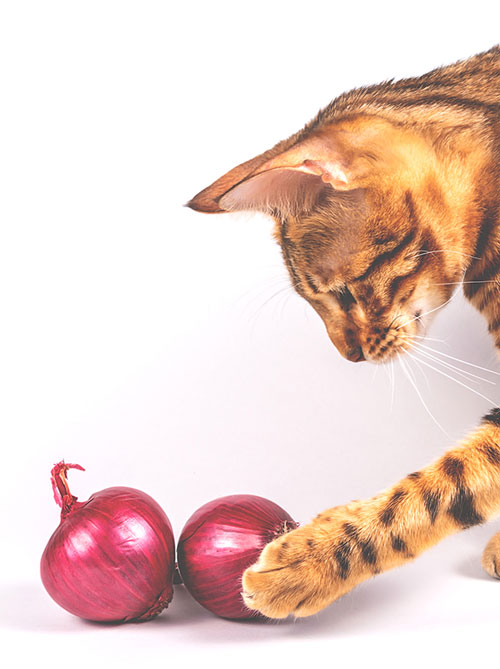
Onion poisoning is a complex disease characterized by a host of gastrointestinal complications and anemia-like conditions like Heinz body anemia, hemolytic anemia, and methemoglobinemia. All these three anemia-like conditions result from severe damage to red blood cells and could easily kill your cat if you do not seek prompt medical intervention.
The symptoms of onion poisoning in cats include;
i. Signs of gastrointestinal distress, such as;
✔ Nausea and loss of appetite,
✔ Vomiting,
✔ Diarrhea (which may lead to dehydration),
✔ Abdominal pain.
ii. Anemia-like symptoms, including;
✔ Paleness or yellowing of the gum and skin,
✔ Panting,
✔ Allergic reactions like asthmatic attacks,
✔ Contact dermatitis,
✔ Rapid and labored breathing,
✔ Elevated heart rate,
✔ Fatigue,
✔ Discolored urine.
- High protein formula, with real chicken as the first ingredient
- Fortified with guaranteed live probiotics to support digestive and immune health
- Crunchy kibble and meaty, shredded pieces for a delicious mealtime experience
Last update on 2025-04-13 / Affiliate links / Images from Amazon Product Advertising API
So, what happens if a cat eats onion?
Since onion is such a common food ingredient, we may never be able to completely cushion our cats from helping themselves to onion-containing foods.
But then, you could be wondering, how do I know if my cat ate an onion?
You can tell that your cat has eaten onions by observing the animal for any of the symptoms mentioned above.
Sometimes, you don’t have to wait for your cat to develop symptoms of onion poisoning to determine that he has ingested onions. You only need evidence that the animal has consumed onion-containing foods to know that he has been exposed to this potentially deadly spice.
Exposure could result from improper storage of food in the kitchen, such as leaving food unsealed. Remember, your cat has a strong sense of smell and will always find his way to your aromatic onion-containing dishes in the kitchen.
Other scenarios where cats may help themselves to onion include leaving food crumbs on the table after consuming onion-based delicacies, or leaving the trash can empty or half-sealed after disposing of food leftovers.
But the toxicity posed by disulfides and thiosulphates isn’t the only reason to avoid feeding onion-based foods to your cat.
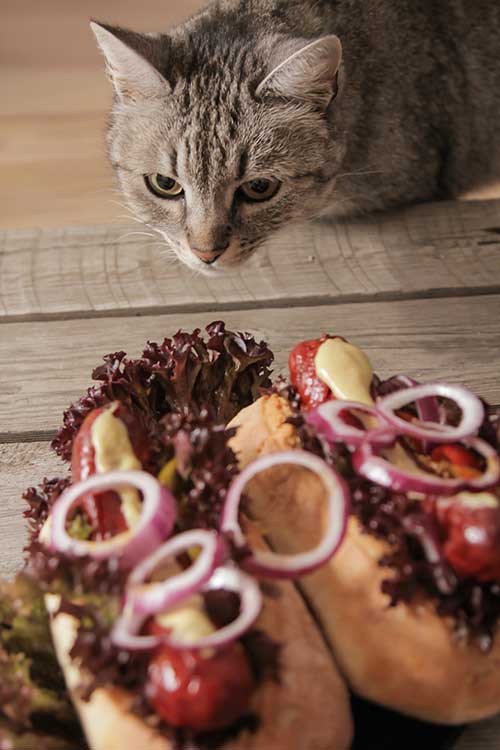
It’s also worth noting that cats are obligate carnivores. Which means that they can live exclusively on a diet of animal protein like beef, poultry, or seafood. Therefore, a cat’s digestive system is primarily designed to handle animal-based foods.
Now, onions are fundamentally plant-based products. Since a cat’s digestive system isn’t evolutionarily designed to process plant-based foods, feeding onions to your kitto could trigger severe gastrointestinal distress. Symptoms usually range from nausea and vomiting to diarrhea, abdominal pain, and loss of appetite.
Well, that’s not to mean that cats cannot consume greens from time to time. In fact, you’ll occasionally catch your cat nibbling on grass blades in your backyard or garden. Sometimes cats consume grass and plant leaves to ease indigestion. However, onions, grass, and most plant-based products have little nutritional value for cats.
Is Smelling Onions Bad For Cats?
By now, you most probably know that ingesting onions could be disastrous for cats. But what of smelling onions?
Well, smelling onions won’t hurt your cat. That’s especially true for whole, unsliced onions.
Now that smelling onions isn’t as toxic to cats as ingesting the spice is, can I cut onions around my cat?
While you can cut onions around your cat, you probably shouldn’t. When an onion is sliced open, it releases some of its compounds, particularly sulfides like n-propyl disulfide. These compounds react with air to form a gas known as syn-propanethial-S-oxide.
Syn-propanethial-S-oxide plays a crucial role in the normal growth cycle of onions – deterring critters that would want to feed on onion bulbs underground. However, it also happens to be the same gas that causes tearing when chopping onions.
- DOG SKIN AND COAT SUPPLEMENT: Loaded with Omega-3 fatty acids, this skin and coat supplement for dogs and cats supports your pet's...
- NATURAL IMMUNE SUPPORT: The EPA and DHA in our dog supplements formula fortify the immune system, supporting health and wellness...
- FOOD TOPPER: This liquid formula is suitable as a dog and cat food topper. For pet parents looking for an alternative to capsules,...
Last update on 2025-04-13 / Affiliate links / Images from Amazon Product Advertising API
So, do onions make cats cry?
Yes, the syn-propanethial-S-oxide gas released when onions are chopped open is capable of making cats cry. I guess the last thing you want is to see teardrops rolling down your kitto’s cheeks while preparing onions for your next meal. So, always avoid chopping onions with your cat nearby.
Are All Onion Types Toxic To Cats?
Onions come in various shapes and sizes, depending on the variety and the parts of the plant in question. Examples include green onions, red onions, onion bulbs, onion leaves, onion powder, etc.
There’s also the question of which is the safer option between raw and cooked onions.
In this section, we highlight the various forms in which onions are generally available and how potentially toxic each form is to your feline friend.
Are green onions poisonous to cats?
Green and red are some of the predominant onion colors.
Green onions are commonly consumed boiled or steamed, while red onions are tastier when grilled, roasted whole, or used in salads.
In terms of the concentration of compounds, red onions tend to be stronger than their green counterparts. However, both onion varieties are toxic to cats.
You may occasionally find yourself wondering, ‘my cat ate red onion, what will happen to him?’
The consequences of cats eating onions are pretty much the same, regardless of the variety or part of the plant that your cat has eaten.
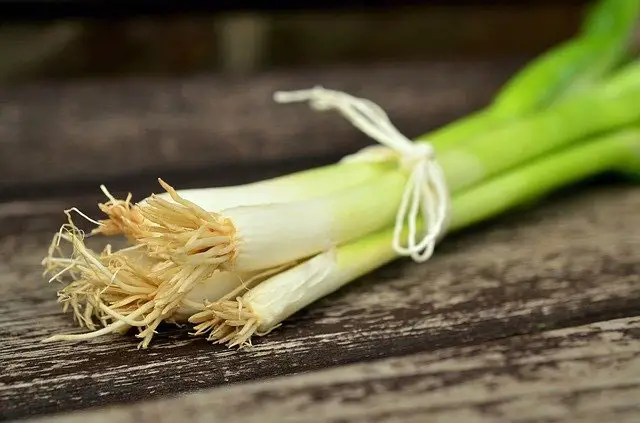
Is spring onion OK for cats?
Spring onions refer to the green leaves that sprout from onion bulbs. They’re sweeter, mellower, and contain fewer antioxidants than regular onion bulbs.
Unfortunately, spring onions can still cause the same adverse effects to cats as regular onion bulbs.
Can cats eat onion skin?
Onion bulbs are made up of three layers, namely the outer layer, the middle layer, and the inner layer. Onion skin is basically the outer layer. It’s also known as the tunic.
Now, the innermost layers of onion bulbs generally contain a higher concentration of disulfides and thiosulphates compared to the outer layers.
Can cats eat onion skin then? No, they can’t.
While onion skin contains fewer toxic compounds than the inner layers, the concentration of these compounds is still high enough to cause severe toxicity in most cats.
Plus, onion skin is relatively harder than the inner onion layers. So, there are additional risks of choking. That underscores the importance of taking urgent remedial action if you suspect that your cat ate onion skin.
Can cats eat onion peel?
Onion peel, much like onion skin and the innermost onion layers, is harmful to cats.
You may often find yourself wondering, ‘my cat ate an onion peel, what should I do?’
As onion peel is just as toxic to cats as onions in general, it’s important to watch out for any symptoms of gastrointestinal distress and/or anemia. You can then seek urgent medical intervention to prevent the situation from becoming life-threatening. More on this later on.
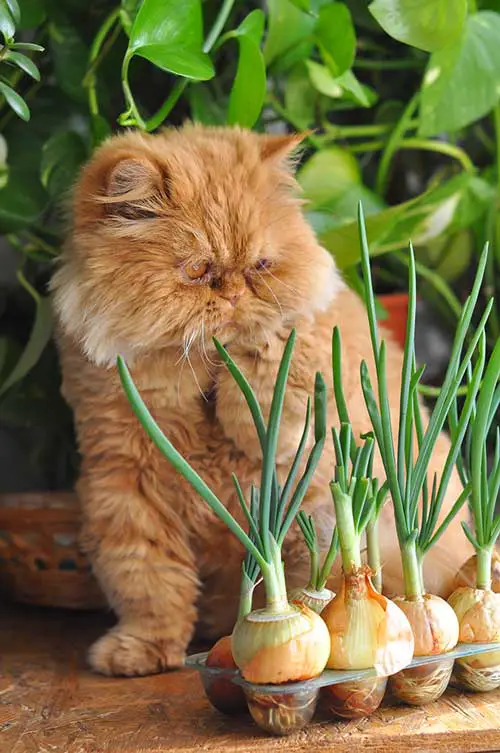
Can cats eat onion rings?
Cats should not eat onion rings for reasons we’ve already highlighted. The fact that onion rings mostly comprise the innermost parts of onion bulbs makes them even deadlier for cats.
Once in a while, you may be inclined to ask, ‘my cat ate onion ring, should I be worried?’
Yes, you have all the reasons to be worried if your cat ate onion rings. But the most important thing to do is prevent the situation from becoming deadly for your feline friend.
Can cats eat onion powder?
You may come home one day and find that your cat licked onion powder, then begin to wonder if your feline friend will become sick.
So, cats should definitely not eat powder onions.
Can cats eat raw onions?
Raw onions are comparatively more toxic to cats than cooked onions. Cooking generally denatures most of the disulfides in onions, making these compounds less toxic.
However, be warned that cooking will not necessarily make onions toxic-free.
You may need to overcook onions to destroy all the harmful disulfides and thiosulphates in these spices. Unfortunately, that would also mean destroying any other nutrient in the vegetable that your cat could have benefited from.
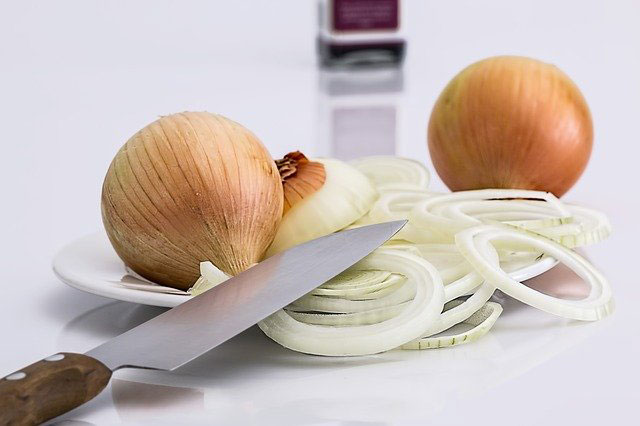
Can cooked onions hurt cats?
We’ve just seen that cooking destroys some of the compounds in onions that could harm your cat. That may get you wondering, should I feed cooked onions to my cat or are cooked onions toxic to cats?
The fact that cooked onions are safer for cats than raw onions doesn’t mean you should feed them to your kitto. In fact, you should be concerned if you discovered that your cat ate cooked onion, as the animal may still develop many of the health complications associated with onions in general.
The fact that cats cannot eat cooked onions also means they can’t eat onion soup either. Again, this underscores the need for medical intervention if you discovered that your cat ate onion soup.
Can cats eat sour cream and onion chips?
Cats shouldn’t eat sour cream. In fact, adult cats shouldn’t consume dairy products at all. That’s because dairy products contain lactose and the body of mature cats lacks lactase – the enzyme required to digest lactose. Plus, sour cream usually contains too much salt, another common household ingredient that’s potentially dangerous to cats.
Cats shouldn’t consume onion chips either. That’s because onion chips are usually flavored using onion powder.
My cat ate cheese and onion crisps, should I be worried?
We’ve just highlighted how risky dairy products are to cats. Just like fresh milk, yogurt, or sour cream, cheese is harmful to cats as most cats are lactose-intolerant.
Besides, most choose products usually contain excess fat and salt, a combination that cats shouldn’t have.
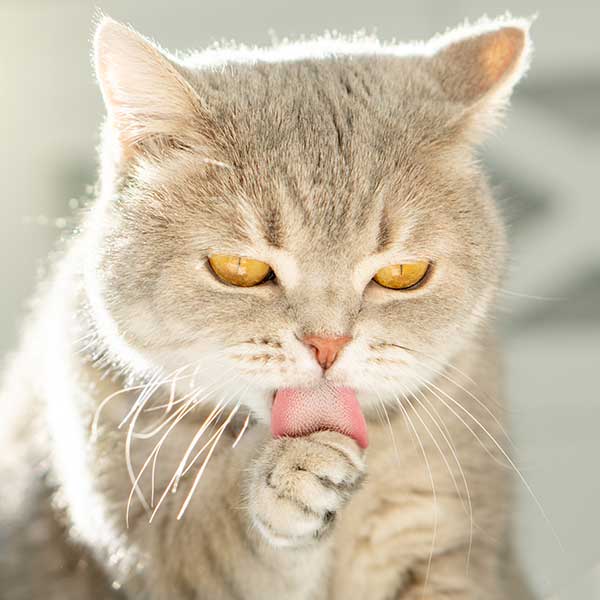
Is French onion dip bad for cats?
French onion dip, also known as California dip, is an American dip typically made from a base of sour cream which is flavored using minced onion. The dish is commonly served with snack crackers and crudités.
Should I be worried if my cat ate French onion dip?
Yes, you should. All the key ingredients in French onion deep, including sour cream and minced onion, are highly toxic to cats.
Can cats eat chicken cooked with onions?
Remember what we said about cats being obligate carnivores? Your feline friend requires a diet of meat to thrive. That includes beef, mutton, poultry, seafood, etc.
However, the most important thing is how you prepare the food before offering it to your cat. Experts discourage feeding cats chicken cooked with spices like onions or condiments like salt.
So, if your cat ate chicken cooked with onion, it may only be a matter of time before the signs of onion poisoning set in.
Can cats eat onion grass?
Onion grass is a plant from the bulbous family with a taste similar to that of onions. The grass usually grows spontaneously as weed, although it can also be cultivated systematically.
Onion grass is perfectly safe for humans. However, the fact that it comes from the same family as regular onions means the plant also contains compounds that could harm cats. So, cats shouldn’t eat onion grass.
How Much Onion Is Dangerous For A Cat?
So far, it has become abundantly clear that onion by any other name will likely harm your cat. However, you could still be wondering, will a tiny piece of onion hurt a cat? And if no, can cats have onions?
The potential toxicity of onions for cats typically depends on a variety of factors, including the cat’s age, body weight, and overall immunity.
1. Age
The stomach of kittens is more sensitive than that of mature cats. Therefore, anything that’s generally harmful to adult cats will most certainly be toxic to kittens.
So, you can expect even more severe side effects if your kitten ate a piece of onion.
2. Body size/weight
Body weight is another factor to consider for cat owners wondering how much onion is toxic for cats.
According to veterinary officers, one gram of onions is all it takes to cause toxicity to a five-pound cat.
3. Overall immunity
While all cats should avoid onions, cats with compromised immunity are more likely to suffer severe adverse effects of onion poisoning.
That includes sickly cats, cats recovering from a surgical operation, and pregnant or breastfeeding cats.
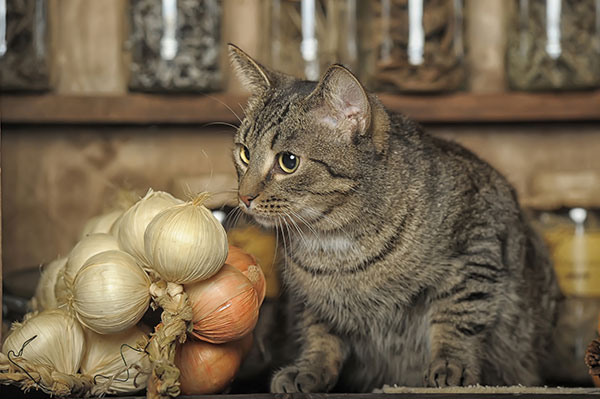
Do portions matter?
Yes, the amount of onion your cat consumes also determines the severity of the side effects of onion poisoning. The higher the quantity, the more severe the adverse effects.
So, how much onion will hurt a cat?
The amount of onions that could hurt your cat depends on factors like age and body weight.
How much onion will kill a cat?
Based on the toxicity of onions for cats, it’s not unusual to find yourself wondering, can cats die from eating onions?
While your cat may not drop dead from eating onions, the adverse effects of onion toxicity may eventually kill your cat. That’s especially if you do not seek urgent medical intervention.
In terms of the onion portions that may kill your cat, the answer lies in the amount of onion the cat has eaten, as well as factors like his age and body weight. While you shouldn’t get worked up if your cat ate a small amount of onion, the situation can be dire if the animal has helped himself to a substantial amount of onions.
- EASY TO USE, IMPACTFUL RESULTS: Collect a sample, package it up, and send it securely back. Just register, swab, return with the...
- MOST COMPREHENSIVE BREED & TRAIT: Our test distinguishes over 20+ distinct breeds and 50+ trait markers with the most...
- SCREEN FOR 40+ GENETIC DISEASES: Get peace of mind by screening for 64 health markers associated with 43 diseases for which your...
Last update on 2025-04-13 / Affiliate links / Images from Amazon Product Advertising API
What Should You Do If Your Cat Eats Onions?
It’s not unusual to stumble upon a cat owner wondering, ‘my cat loves onions although I don’t feed onions to him, but what should I do if my cat ate onion behind my back?’
Now, it’s important for every cat owner to understand how to treat onion poisoning in cats.
First off, you’ll need to establish how much onion your cat has consumed. As we’ve just seen, the quantity of onion consumed is one of the factors that determine the severity of onion poisoning in cats.
Next, try to understand the symptoms of onion poisoning and how soon the side effects kick in. Note that the symptoms of gastrointestinal distress, such as vomiting and diarrhea, usually appear within a day or two of exposure to onions.
However, it may take a couple of weeks for a cat to develop anemia-like symptoms. In the same breath, try to understand how long the side effects last.
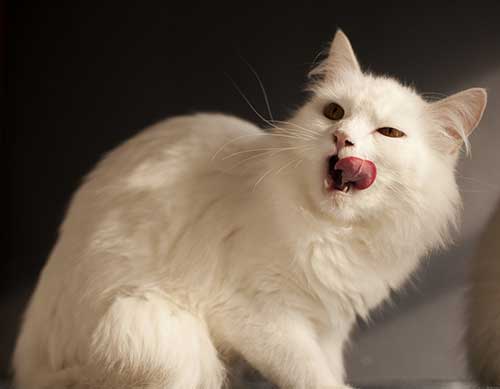
So, how long does onion poisoning last in cats?
The symptoms of gastrointestinal distress may last between one day and one week before the condition is effectively managed. However, anemia-like symptoms could last longer.
The last thing to do is adopt the right remedy depending on the symptom you’re treating. For instance, you may consider offering the cat water, flavored drinks, or broth to counter dehydration resulting from vomiting and dehydration. You could also give the animal activated charcoal or induce vomiting to prevent the further absorption of toxins into his system.
Most importantly, remember that these are just emergency measures you take to stabilize the cat before taking him for a professional examination.
Conclusion
Onions are highly toxic to cats and should be avoided at all costs. There are almost always side effects to watch out for, whether your cat ate a little bit of onion or the animal consumed huge amounts of the vegetable.
You can prevent your cat from becoming exposed to onions by undertaking any of the following measures;
✔ Keep all onions out of your cat’s reach.
✔ Keep all cooked food covered and store it in the refrigerator or high shelves.
✔ Seal trash cans tightly.
✔ Clean the table or wipe the floor thoroughly after every meal to prevent the cat from snacking on onion-containing food crumbs.
If your cat accidentally ate onions behind your back, it’s important to take him to the vet immediately. That’s the only way to prevent the animal from developing the various adverse side effects of onion poisoning.
Checkout Our Favorite Cat Products
1. Best Online Course For Cat Parents
Our favorite: The Cat Language Bible (How to Finally Understand And Speak to Your Cat) – A new form of cat to human communication that many cat owners have dreamed about… but few have actually thought possible.
2. Best Immune Support For Cats
Our favorite: Tomlyn Immune Support – Best Supplement for Cats and Kittens.
3. Best Cat Treats
Our favorites: LIFE ESSENTIALS All Natural Freeze Dried Chicken And Sheba Meaty Tender Sticks – Both are Great.

